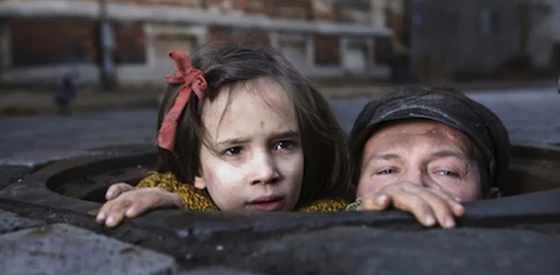- MENU
- HOME
- SEARCH
- WORLD
- MAIN
- AFRICA
- ASIA
- BALKANS
- EUROPE
- LATIN AMERICA
- MIDDLE EAST
- United Kingdom
- United States
- Argentina
- Australia
- Austria
- Benelux
- Brazil
- Canada
- China
- France
- Germany
- Greece
- Hungary
- India
- Indonesia
- Ireland
- Israel
- Italy
- Japan
- Korea
- Mexico
- New Zealand
- Pakistan
- Philippines
- Poland
- Russia
- South Africa
- Spain
- Taiwan
- Turkey
- USA
- BUSINESS
- WEALTH
- STOCKS
- TECH
- HEALTH
- LIFESTYLE
- ENTERTAINMENT
- SPORTS
- RSS
- iHaveNet.com: Movie Reviews

4 Stars
"In Darkness" is a pitiless glimpse into the inferno, into hell not only on earth but below it. Based on a true story, it visits the sewers of the Polish city of Lvov during World War II, a place where a group of Jews lived for more than a year under circumstances that are almost unimaginable.
But, as directed by the veteran Agnieszka Holland, "In Darkness" is not a typical Holocaust film. For one thing, even more than in her 1990 film "Europa, Europa," Holland's directing style is cool, almost dispassionate. It's as though she's insisting that, as detailed in David Shamoon's effective script, these horrific events should speak for themselves without special pleading, if they are to speak at all. And for another, the film's focus is not on the Jews but on the anti-Semitic, Catholic Pole who becomes their unlooked-for savior and lifeline.
Not only did Leopold Socha (top Polish actor Robert Wieckiewicz) look unsympathetically on Jews, he was hardly a model citizen. An inspector in Lvov's sewers by day, by night he was a burglar, hiding his loot in the underground system and returning to his wife Wanda (Kinga Preis) and their daughter like nothing had happened.
If Socha stands out as the protagonist from the start, the Jews he ends up saving are, perhaps intentionally, harder to tell apart at first, a situation that parallels the undifferentiated way Socha himself tends to view them.
Sensing that a liquidation of the Lvov ghetto is imminent, the Jews investigate the sewers as a potential hiding place, which is where they literally run into Socha, who tells them, truthfully as it turns out, that no one knows this underground world as well as he does. Socha agrees to help the Jews find a hiding place, but for a steep price. He'll take their money now, he tells his assistant, and then think about turning them in to the Germans for a reward when the cash runs out. For their part, the demanding Jews can barely hide their contempt for this man: "Never trust a Polack" is about the mildest thing they say.
Gradually, however, Socha -- and viewers -- are able to tell the Jews apart. Among them are Mundek (Benno Furmann), the confidence man who is their de facto leader, and Klara (Agnieszka Grochowska), who worries about her errant sister.
Helping make "In Darkness" so realistic and so involving is Holland's decision, apparently taken against the advice of the screenwriter and the producers, to tell this story in all its multiple original languages. Having characters often not understanding each other as they speak Polish, Yiddish, German and Ukrainian underlines the fraught complexity of Poland's ethnic situation. "In Darkness" is also honest enough to show how the enmities and conflicts that existed among the Jews aboveground were carried into the sewer and worsened by that desperate environment.
Holland, interestingly enough, dedicates "In Darkness" twice. At the film's beginning, she singles out Marek Edelman, the Jewish leader of the legendary Warsaw Ghetto rebellion. At the end, mention goes to the more than 6,000 Poles, more than any other nationality, who are recognized as Righteous Gentiles by the Israeli government for having risked their lives to save Jews. "In Darkness" shows us how extraordinarily fraught that choice was.
MPAA rating: R (for violence, disturbing images, sexuality, nudity and language).
Running time: 2:25.
Cast: Robert Wieckiewicz (Leopold Socha); Benno Furmann (Mundek Margulies); Agnieszka Grochowska (Klara Keller); Maria Schrader (Pauline Chiger).
Credits: Directed by Agnieszka Holland; written by David F. Shamoon, based on the book by Robert Marshall; produced by Steffen Reuter, Patrick Knippel, Marc-Daniel Dichant, Leander Carell, Juliusz Machulski, Paul Stephens and Eric Jordan. A Sony Classics release.
Copyright © Tribune Media Services, Inc.
In Darkness Movie Review - Robert Wieckiewicz and Benno Furmann